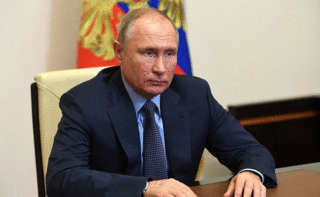Decision-Making
Putin and the Power of Disobedience
Anonymous acts of insubordination can change history.
Posted March 22, 2022 Reviewed by Abigail Fagan
Key points
- Putin may be in charge of Russia's Ukraine invasion, but he cannot do it alone.
- Disobedience can take many forms—including defiance, refinement, grudging obedience, and exit—and has a long and storied history.
- Increasing insubordination could turn the tide in the Ukrainian conflict.
My friend and colleague Mark Mutz recently pointed out to me that Vladimir Putin cannot fire a missile. He can issue an order that a missile be fired, but the actual targeting and launch requires expertise that Putin lacks, as well as the cooperation of many people with independent decision-making capacity. Just because an order has been issued does not make it possible or morally right to obey.

History of Disobedience
Mark's comment led to an enlightening conversation about disobedience, part of which I want to summarize here. In the Book of Exodus, Pharaoh, who fears the captive Israelites are becoming too numerous and wishes to eliminate the threat of rebellion and assimilate them into Egyptian culture, orders the Hebrew midwives to kill newborn boys but allow girls to live. The midwives, however, “feared God” and did not follow the commander-in-chief’s order, explaining that “Hebrew women are not like Egyptian women; they give birth before the midwives arrive.”
Although not an act of military insubordination, the midwives’ inaction, presumably undertaken at great personal risk, serves as a reminder that disobedience can take many forms. Eric Hundman has recently identified four categories of disobedience: defiance, refinement, grudging obedience, and exit. Based on these categories, it is possible to disobey but remain loyal. In some cases, loyalty may in fact require disobedience. Suppose, for example, that a superior issues a command to surrender, but a subordinate knows that an alternative course of action would secure certain victory.
Types of Disobedience
Defiance is perhaps the most dramatic form of disobedience. Hundman cites the August 1944 example of German General Dietrich von Choltitz, who defied Hitler’s command to reduce Paris to rubble by falsifying documents, issuing fake orders to fool wiretappers, downplaying his forces’ capacity, and dissuading other officers from following orders. Although he did not directly confront Hitler with his refusal to obey, “he actively and creatively worked to make sure that [Hitler’s order] was not implemented.” The mere fact that a superior commands something does not make it right.
In the case of Russia’s war against Ukraine, on March 14 a Russian state television employee positioned herself behind a newscaster during a live newscast with a sign that read, “No war. Stop the War. Don’t believe the propaganda. They’re lying to you here.” She also chanted the words, “Stop the war.” She did so in defiance of new Russian legislation that bars “discrediting the Russian armed forces” and carries a prison term of up to 15 years. Examples of defiance in the military include many media reports of Russian soldiers abandoning and even sabotaging their own equipment.
Refinement is a more subtle form of disobedience, which in some cases may be met not with condemnation but praise. Hundman relates the 1989 story of a General in the Chinese army who, fearing indiscriminate bloodshed and damage to the reputation of the army, felt it would be inappropriate to move troops into Tiananmen Square to quell student protests. To make his case, he met personally with his superiors. According to intercepted radio transmissions, some Russian troops in Ukraine have interpreted orders to open artillery fire to include an implied condition that civilians be evacuated first.
Another form of disobedience is grudging obedience. In this situation, the subordinate follows orders but does so reluctantly, perhaps with grumbling or foot-dragging. Hundman cites the 1854 Crimean War case of Vice Admiral James Whitley Dundas, who obeyed an order to attack despite his certainty that it would “be of no service to the army.” In Ukraine, captured Russian soldiers have expressed grave regrets about “crimes” they have committed, acknowledging that they “will be judged” — a frame of mind hardly consistent with deep conviction.
The final form of disobedience is exit, in which a soldier elects to leave the military. Ukrainian President Volodymyr Zelensky has been encouraging Russian troops to abandon their posts, saying, “We hear your conversations on the intercepts, we hear what you really think about this senseless war, about this disgrace and about your state.” To encourage surrender, he promises, “We will treat you the way people are supposed to be treated — as people, decently, in a way you were not treated in your army. And in a way your army does not treat ours.”
Zelensky calls out to Russian soldiers first and foremost as human beings. He urges them to forget about obedience to their commanders and instead recognize their deeper loyalty to humanity and decency. There can be no doubt that his appeal contradicts the usual presumption of military discipline, but in so doing, he echoes novelist Leo Tolstoy’s account of the disastrous effect of military indoctrination on the human conscience: "Discipline consists in this, that the men who undergo the instruction and have followed it for a certain time are completely deprived of everything which is precious to a man — of the chief human property, rational freedom — and become submissive, machine-like implements of murder in the hands of their organized hierarchical authorities."
The Case for Disobedience
The theoretical groundwork for disobedience has been laid by great figures in our history. Jesus, for example, urges his followers to “render under Caesar what is Caesar’s,” withholding the greater part for God. Socrates famously disobeyed an unjust order of the 30 tyrants and argued that it was better to be just and suffer than to profit from injustice. Thoreau, who inspired Tolstoy, wrote that his duty, and that of every person, is only to “do at any time what I think is right.” Martin Luther King called on those who break unjust laws to do so “openly, lovingly, and with a willingness to accept the penalty.”
It is tempting to regard the poor performance of Russian ground forces in Ukraine as solely the product of poor decision-making, strategy, tactics, equipment, training, and readiness. In fact, each of these factors is probably partly to blame. But we should not forget another factor that is likely at work — waning conviction on the part of those who have been sent to do the fighting. Abandoned military equipment, convoys that resemble logjams, and foraging soldiers may represent symptoms of something far more significant than mere incompetence — namely, they may be signs of active disobedience.
Coordinated power is greatest at the top, but power at lower levels of a military or political hierarchy, though typically uncoordinated, is vastly greater. For example, many historians regarded Napoleon’s will as the engine behind the French invasion of Russia in 1812. From Tolstoy’s point of view, however, this cannot be true, as Napoleon shot at and killed no one. Had Napoleon truly been in charge, at any moment he could have ordered his men to cease hostilities and return home, but had he done so, Tolstoy writes, “They would have killed him and proceeded to fight the Russians” anyway.
Vladimir Putin is but one human being. To be sure, he appears to exercise increasingly unchallenged rule over the world’s geographically largest county, a nation of 144 million people with an economy the size of Texas’ and the world’s largest nuclear stockpile. But he is still just one person, and his ability to effect his purposes hinges completely on the comprehension or incomprehension, willingness or unwillingness, belief or disbelief in his aims and rationales by his countrymen. He can persuade, intimidate, coerce, or even kill his comrades, but he cannot wage war without them.




